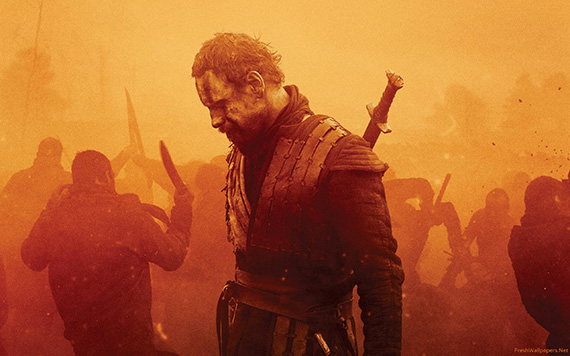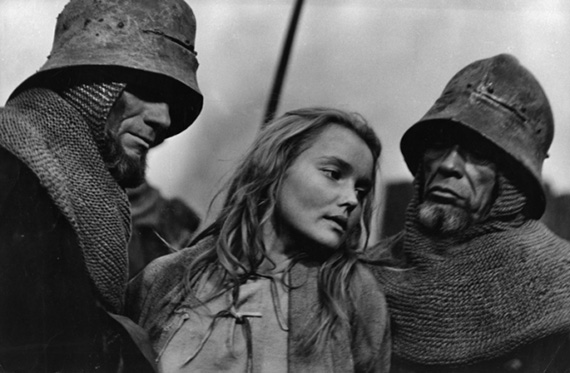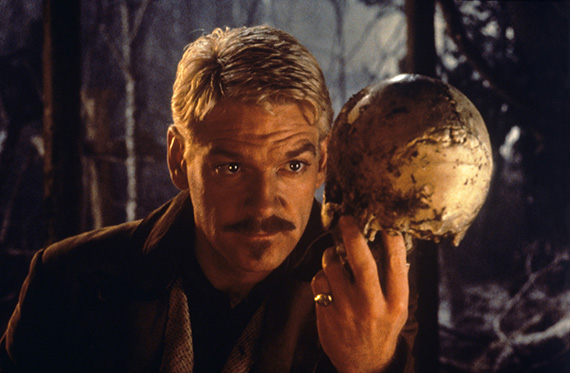 Production still from All Night Long 1962 / Director: Basil Dearden / Image courtesy: Park Circus
Production still from All Night Long 1962 / Director: Basil Dearden / Image courtesy: Park Circus
‘Shakespeare on Screen’ is a celebration of the timeless power of the works of William Shakespeare. This free cinema program commemorates the 400th anniversary of Shakespeare’s death by screening a collection of the most inventive, well-crafted, and beloved films inspired by the Bard.
The program offers a taste of the long and storied history of screen adaptations of Shakespeare’s plays. From the silent The Merchant of Venice 1923 (Screens 11am Saturday 23 April) through to 2015’s Macbeth (Screens 6pm Friday 29 April), the films featured here illustrate the enduring appeal of these classic texts and their continuing relevance to modern audiences.
 Production still from Macbeth 2015 / Director: Justin Kurzel / Image courtesy: Transmission Films
Production still from Macbeth 2015 / Director: Justin Kurzel / Image courtesy: Transmission Films
Beyond the more traditional adaptations that have been included – ‘traditional’ in the sense that the filmmakers have attempted to faithfully recreate the substance of the original plays for screen – the program also delves into those films within the diaspora of Shakespearean cinema. Here, the original text is a mere launching pad for the filmmakers to explore new locations, eras, narratives, and any other concepts that spring to life.
 Production still from Korol Lir (King Lear) 1971 / Director: Grigori Kozintsev / Image courtesy: Contemporary Films
Production still from Korol Lir (King Lear) 1971 / Director: Grigori Kozintsev / Image courtesy: Contemporary Films
The breadth of cinematic vision can be seen in the diversity of films on offer in the program, wherein Shakespeare’s works are run through filters of schlock Tromeo and Juliet 1996 (Screens 8.30pm Friday 13 May), Theatre of Blood 1972 (Screens 8pm Wednesday 25 May), postmodernism Rosencrantz and Guildenstern are Dead 1990 (Screens 8.15pm Friday 22 April and 6pm Friday 20 May), King Lear1987 (Screens 8pm Friday 20 May), science-fiction Forbidden Planet 1956(Screens 12.30pm Saturday 30 April) and revisionist history Richard III 1996 (Screens 8pm Wednesday 27 April and 25 May), Coriolanus 2008 (Screens 8pm Wednesday 27 April).
 Production still from Romeo + Juliet 1996 / Director: Baz Luhrmann / Image courtesy: Hollywood Classics
Production still from Romeo + Juliet 1996 / Director: Baz Luhrmann / Image courtesy: Hollywood Classics
‘Shakespeare on Screen’ is littered with unforgettable performances from major actors – featuring a baby-faced Leonardo DiCaprio in Romeo + Juliet 1996 (Screens 6pm Friday 22 April and 6 May ), a ruthless Ian McKellen in Richard III 1996, a crazed Toshiro Mifune in Throne of Blood 1957 (Screens 6pm Wednesday 4 May), and a forceful Michael Fassbender in Macbeth 2015, among so many others. The program is also a chance to see icons of Shakespearean stage and screen at their finest, with opening weekend appearances from Orson Welles as Falstaff in his final narrative feature Chimes at Midnight 1965 (Screens 12.30pm Sunday 24 April), Laurence Olivier in Henry V 1944 (Screens 2.45pm Sunday 24 April), and Kenneth Branagh leading the all-star cast of Hamlet 1996 (Screens 1pm Monday 25 April).
 Production still from Ran 1985 / Director: Akira Kurosawa / Image courtesy: StudioCanal
Production still from Ran 1985 / Director: Akira Kurosawa / Image courtesy: StudioCanal
Two of the masters of world cinema are represented through the inclusion of Akira Kurosawa’s Throne of Blood 1957 and Ran 1985 (Screens 6.30pm Wednesday 11 May), and rare screenings of Grigori Kozintsev’s Hamlet 1964 (Screens 8.25pm Wednesday 4 May) and King Lear 1971 (Screens 2.45pm Saturday 7 May). These titles transport Shakespeare to the mists of feudal Japan and the harsh plains of Eastern Europe, respectively, and consequently give new shape and feel to the original texts. Further, Jean-Luc Godard appears through his English-language King Lear 1987, which finds the French New Wave legend tearing up the eponymous play in an idiosyncratic treatise on Shakespeare, adaptation, and post-modernism.
 Production still from Hamlet 1996 / Director: Kenneth Branagh / Image courtesy: Roadshow
Production still from Hamlet 1996 / Director: Kenneth Branagh / Image courtesy: Roadshow
There are also films from two Australian directors: Baz Luhrmann and Justin Kurzel, who offer decidedly modern versions of their chosen plays. Lurhmann’s much-loved Romeo + Juliet 1996 exemplifies his trademark ostentatious visual and musical style, while Kurzel’s Macbeth 2015 carries the intensity of his debut Snowtown 2011 from South Australia to the Scottish highlands in a powerful take on the classic tragedy.
The Australian Cinémathèque is proud to present the majority of these films in their original 35mm format. The texture of real film adds colour and life to the vivid imagery of Julie Taymor’s Titus 1999 (Screens 6.30pm Wednesday 18 May); it adds depth and richness to the shadows of Akira Kurosawa’s Throne of Blood 1957; it adds crackle and grime to the sleaze of Troma’s Tromeo and Juliet 1996. These screenings are rare opportunities for audiences to be able to experience the films as they were originally intended to be seen.
In particular, it is a pleasure to be able to present Der Kaufmann von Venedig (The Merchant of Venice) 1923 (Screens 11am Saturday 23 April) – a silent German film loaned to us by the Bundearchiv (German Federal Archives). It is a lavish production, with scores of extras and location shooting in Venice – making it a wonderful time capsule of the city almost 100 years ago. The film will feature live musical accompaniment from David Bailey on the Gallery’s 1929 Wurlitzer Organ.
The ‘Shakespeare on Screen’ cinema program will also include a forum day – to be held on Saturday April 23, the actual 400th anniversary of Shakespeare’s death – at which local scholars of Shakespeare will engage in a lively discussion around the history of Shakespearean adaptation and the continuing relevance of the plays for contemporary audiences.
Despite much of the tragedy on display throughout the films included in this program, ‘Shakespeare on Screen’ is a celebration of the Bard’s many masterpieces. There is everything one could hope for in cinema: love and death, comedy and betrayal, beauty and bloodshed – all inspired by the most frequently adapted author in film history.
Shakespeare on Screen Forum
1pm 23 April 2016 / Cinema A, GOMA
Please RSVP for this free event through Eventbrite.
Join prominent local scholars of Shakespeare at the Gallery of Modern Art for a discussion of the history of Shakespearean adaptation and the continuing relevance of the plays for contemporary audiences. Speakers will include: Professor Peter Holbrook (University of Queensland); Associate Professor Rob Pensalfini (University of Queensland); Associate Professor Laurie Johnson (University of Southern Queensland); Dr. Brandon Chua (University of Queensland); Dr. Christian Long (University of Queensland/QUT). The event will be chaired by University of Queensland lecturers, Dr. Jennifer Clement and Dr. Lisa Bode.
1pm Opening Talk | Peter Holbrook “Shakespeare’s Afterlives”
1.30pm – 3pm Panel 1 | Roundtable Discussion “Why Shakespeare?”
3.30pm-5pm Panel 2 | Roundtable Discussion “Shakespeare on Screen”
Presented by the QAGOMA, the UQ School of Communication and Arts, and the UQ Node of the ARC Centre of Excellence for the History of Emotions (Europe 1100-1800).
 Production still from Richard III 1995 / Director: Richard Loncraine / Image courtesy: Park Circus
Production still from Richard III 1995 / Director: Richard Loncraine / Image courtesy: Park Circus
Shakespeare on Screen | Free film program
22 April – 25 May 2016
Australian Cinémathèque, Gallery of Modern Art, Brisbane
Australian Cinémathèque
GOMA is the only Australian art gallery with purpose-built facilities dedicated to film and the moving image and offers a rare opportunity to see films presented on the big screen as they were intended, and features many 35mm prints sourced from film archives around the world and screened in one of Australia’s last 35mm film venues.
Theo Angelopoulos | Free film program
15 April – 22 May 2016
Arabian Nights | Free film program
25 – 26 June 2016
Snow White | Ticketed
11 and 18 September 2016
Want to know what’s on at QAGOMA?
Shop online for a range of art books
View our selection of design objects, art merchandise and gifts
QAGOMA thanks The National Film Centre, Tokyo; the National Film and Sound Archive, Canberra; Das Bundesarchiv, Berlin; and Filmoteca Española, Madrid for generously providing prints for this program.
Program curated by Robert Hughes, Australian Cinémathèque.
Copyright © 2008
This feed is for personal, non-commercial use only.
The use of this feed on other websites breaches copyright. If this content is not in your news reader, it makes the page you are viewing an infringement of the copyright. (Digital Fingerprint:
)